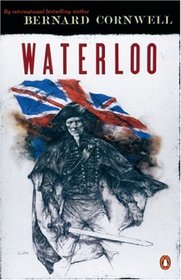Very clever plotting in order to get Mr. Sharpe to the right locale to see the Emperor's troops as they first cross into Belgian territory. It helps if one has read earlier volumes in order to be more familiar with the personalities involved, although this book can stand alone.
This is the chronological Book 20 (and original Book 11) of the Richard Sharpe series.
I'm not really sure what to think about this book. Sharpe's Siege ended up describing Sharpe and Harper's last real battle of the war. Sharpe's Revenge occurred during peace time, but still managed to work in some cloak-and-dagger political warfare. In many ways, Sharpe's Revenge felt like it should have been the last book in the series.
While Waterloo is a natural (and sensible) ending point, it came across as something of an afterthought for the heroes of the series. Sharpe was serving as an officer for the Prince of Orange, and in that capacity he floated around on the fringes of the battle without any real purpose. Harper, having been honorably discharged the year before, came to Waterloo merely as a spectator. The battle happened around both of them, and their own direct involvement was slight.
Cornwell does give us some closure for several characters and situations, but perhaps I am disappointed because I was hoping that he would give us a little bit more. After 20 books, I really cared about what happened to these characters and I would have preferred the Epilogue to be a little more robust and less stingy on the details.
In all, these are small gripes to make against a really great (although rather formulaic) series. I'm glad that I persevered through the painfully slow beginning because I was rewarded with everything that came next. Sharpe and Harper have done their marching and now they deserve their rest.
Based on reviews and other sources, I think that I will be skipping Sharpe's Devil. In that book, Sharpe is a retired soldier-turned-farmer and Harper is an overweight tavern owner in Dublin. The book has them reunite for one last adventure. I think I would prefer leave them as they are now, victorious at Waterloo, and walking away to live the lives that both of them have most definitely earned.
I'm not really sure what to think about this book. Sharpe's Siege ended up describing Sharpe and Harper's last real battle of the war. Sharpe's Revenge occurred during peace time, but still managed to work in some cloak-and-dagger political warfare. In many ways, Sharpe's Revenge felt like it should have been the last book in the series.
While Waterloo is a natural (and sensible) ending point, it came across as something of an afterthought for the heroes of the series. Sharpe was serving as an officer for the Prince of Orange, and in that capacity he floated around on the fringes of the battle without any real purpose. Harper, having been honorably discharged the year before, came to Waterloo merely as a spectator. The battle happened around both of them, and their own direct involvement was slight.
Cornwell does give us some closure for several characters and situations, but perhaps I am disappointed because I was hoping that he would give us a little bit more. After 20 books, I really cared about what happened to these characters and I would have preferred the Epilogue to be a little more robust and less stingy on the details.
In all, these are small gripes to make against a really great (although rather formulaic) series. I'm glad that I persevered through the painfully slow beginning because I was rewarded with everything that came next. Sharpe and Harper have done their marching and now they deserve their rest.
Based on reviews and other sources, I think that I will be skipping Sharpe's Devil. In that book, Sharpe is a retired soldier-turned-farmer and Harper is an overweight tavern owner in Dublin. The book has them reunite for one last adventure. I think I would prefer leave them as they are now, victorious at Waterloo, and walking away to live the lives that both of them have most definitely earned.




![header=[] body=[Get a free book credit right now by joining the club and listing 5 books you have and are willing to share with other members!] Help icon](/images/question.gif?v=90afaeb39)
